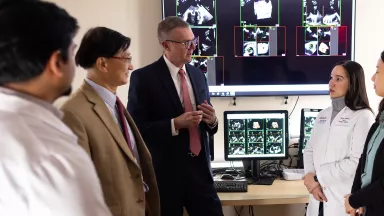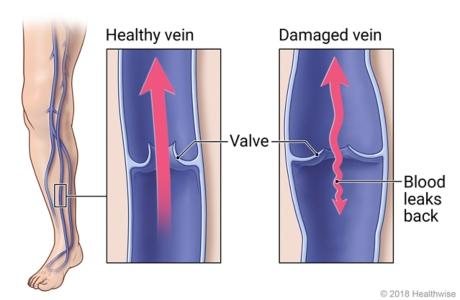Venous Insufficiency
Montefiore Einstein offers the following content from Healthwise’s health information library.
What is venous insufficiency?
Venous insufficiency is a problem with the flow of blood from the veins of the legs back to the heart. The veins of the legs might not work as they should. This can allow blood to leak backward. It can lead to problems that include varicose veins.
In venous insufficiency, the valves in the veins have become damaged. These valves normally keep blood flowing toward the heart. But damaged valves allow some blood to leak backward. This causes the veins to become overfilled. Fluid seeps out of the engorged veins into surrounding tissues. This may result in tissue breakdown and venous skin ulcers.
What causes it?
Venous insufficiency is sometimes caused by deep vein thrombosis and high blood pressure inside leg veins. People who are pregnant, older, overweight, or have a family history of varicose veins are more likely to get it. So are people who smoke or stand for long periods of time.
What are the symptoms?
Symptoms of venous insufficiency affect the legs. Symptoms may include swelling (often in the ankles), cramping, aching, a heavy feeling in the legs, or varicose veins. You may also have skin problems like itching, sores, or changes in skin color.
How is it diagnosed?
Your doctor can diagnose venous insufficiency by examining your legs and by using a type of ultrasound test (duplex Doppler) to find out how well blood is flowing in your legs.
How is venous insufficiency treated?
Your doctor may recommend wearing compression stockings to help relieve symptoms. Your doctor may also suggest other steps to try at home, such as getting regular exercise. Medicine or a procedure can also be treatment options. Procedures can close the vein, remove the vein, or improve blood flow.
How can you care for yourself at home?
Home care may help relieve your symptoms and improve blood flow. For example, wear compression stockings. Get regular exercise. Stay at a healthy weight. Avoid long periods of standing or sitting. Do not sit with your legs crossed at the knee. Prop up your legs above the level of your heart when lying down.
Related Information
Credits
Current as of: August 6, 2023
Author: Healthwise Staff
Clinical Review Board
All Healthwise education is reviewed by a team that includes physicians, nurses, advanced practitioners, registered dieticians, and other healthcare professionals.






